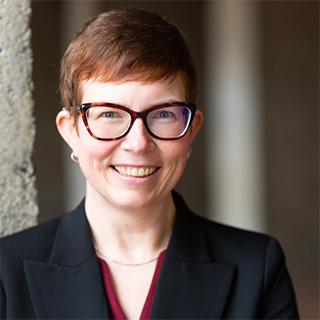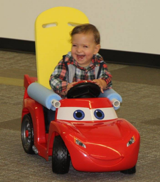April 11, 2023 The machines and devices we use every day – for example, touch screens, gas pedals, and computer track pads – interpret our actions and intentions via sensors. But these sensors are designed based on assumptions about our height, strength, dexterity, and abilities. When they aim for the average person (who does not actually exist), they aren’t usable or accessible. CREATE Post-doctoral student Momona Yamagami seeks to integrate personalization and customization into sensor design and the resulting algorithms…
Category: Newsfeed
Archive of posts with News category
Accessible eSports Showcase 2023: Event Recap
In April 2023, CREATE hosted its first ever Accessible eSports Showcase event, bringing together members of the CREATE community, local community organizations, tech and games Corporate Partners, and folks from all over the Seattle area looking to learn about and celebrate ongoing strides being made in making video games more inclusive and accessible to people with disabilities. Zillow Commons in the Bill & Melinda Gates Center was transformed into a gamer’s playground with big-screen projections of racing and party games,…
International Disability Rights: Past, Present, & Future – A Must-See Public Lecture with Senator Floyd Morris
International Disability Rights: Past, Present, & FuturePublic Lecture with Senator Floyd Morris Wednesday, April 19, 2023, 2:30 p.m. HUB 340Free and open to the public Floyd Morris, Ph.D., is the Director of the Centre for Disability Studies at the University of the West Indies, a current Member and Past President of the Senate of Jamaica – where he was also their first Blind member – and Special Rapporteur on Disability for the Caribbean Community (CARICOM). He has researched inclusion of…
Advisory Board: Welcome ChrisTiana ObeySumner
CREATE welcomes our newest Advisory Board member, ChrisTiana ObeySumner. ObeySumner (they/them) is the CEO and principal consultant of Epiphanies of Equity, a social equity consulting firm specializing in change management, social and organizational psychology, intersectional equity and liberation, and disability justice. For two decades, they’ve dedicated their life and career to exploring and practicing innovative approaches to achieving social equity – in other words, how to sustainably and effectively bring parity to areas of disparity so “humans can human with…
Faculty essay: Signs of Disability

By Stephanie Kerschbaum, CREATE faculty member, Associate Professor of English, and Director of the Program in Writing and Rhetoric I’ve just returned to Seattle from a trip to a conference in Chicago. On that trip, I pointed out to a friend a billboard in a downtown Chicago bus stop inviting viewers to learn to recognize the signs of a rare medical condition. And just a bit later, at my gate in O’Hare, I found myself sitting across from a large…
CSE course sequence designed with “accessibility from the start”
March 8, 2023 The CSE 121, 122, and 123 introductory course sequence lets students choose their entry point into computer science and engineering studies, whatever their background, experience, or confidence level. And, as part of the effort to improve diversity, equity, inclusion, and accessibility (DEIA), the courses were designed with “accessibility from the start.” A member of the course development team was a dedicated accessibility expert, tasked with developing guidelines for producing accessible materials: using HTML tags correctly, providing alt…
Honoring Judy Heumann’s outsized impact
Judy Heumann — disability activist and leader, presidential advisor to two administrations, polio survivor and quadriplegic — passed away on Saturday, March 4. Heumann’s family invited the community to honor her life at a memorial service and burial that is now available on video with ASL, captioning, and English interpretation of Yiddish included. Who was Judy Heumann? Judy Heumann fought for disabled rights and against segregation. She led the “longest nonviolent occupation of a federal building in American history,” according to the New…
UW and CREATE extended family shine in SIGCHI Awards
We’re so proud to have learned from and collaborated with these shining stars! UW and CREATE faculty and our extended family are prominent in the recently announced 2023 SIGCHI Awards. All three winners of the SIGCHI dissertation award, which recognizes “the most outstanding research contributions from recently graduated Ph.D. students within the HCI community” are associated with the UW, CREATE, and/or our campus partner, UW DUB (Design. Use. Build). Congratulations to all! Nicola Dell, ’15 Ph.D. UW Computer Science and…
The Here And Now Project – A Community Partner Profile
The mission of The Here and Now Project (H&NP) is to connect and empower the paralysis community in the Pacific Northwest. They provide care baskets, adaptive water bottles, and peer support to the newly paralyzed and host a rotating calendar of monthly gatherings and other seasonal events and activities throughout Western Washington. H&NP Co-founder and President Kenny Salvini shared the project’s inspiration, recent successes, and foremost goals. “I’ve learned that everyone I meet has a story and a voice that…
Postdoctoral Fellowship application open: Accessibility researcher in physical computing and fabrication
CREATE and UW departments are looking for a postdoc researcher to investigate using fabrication and physical computing technologies to address accessibility.
Jacob O. Wobbrock awarded Ten-Year Technical Impact Award
January 5, 2023 The Association for Computing Machinery (ACM) has honored CREATE Co-Director Jacob O. Wobbrock and colleagues with a 10-year lasting impact award for their groundbreaking work improving how computers recognize stroke gestures. Wobbrock, a professor in the Information School, and co-authors Radu-Daniel Vatavu and Lisa Anthony were presented with the 2022 Ten Year Technical Impact Award in November at the ACM International Conference on Multimodal Interaction (ICMI). The award honors their 2012 paper titled Gestures as point clouds: A $P recognizer…
Rory Cooper, CREATE Advisory Board member, receives IEEE Biomedical Engineering Award
Congratulations to CREATE Advisory Board member Rory Cooper on receiving the 2022 IEEE Biomedical Engineering Award! For more than 25 years, Cooper has been developing technology to improve the lives of people with disabilities and his inventions have helped countless wheelchair users get around with more ease and comfort. Cooper’s first innovations in mobility were a modification to the back brace he wore after a spinal cord injury left him paralyzed from the waist down, then a better wheelchair, then an electric-powered version that…
UnlockedMaps provides real-time accessibility info for rail transit users

Congratulations to CREATE Ph.D. student Ather Sharif, Orson (Xuhai) Xu, and team for this great project on transit access! Together they developed UnlockedMaps, a web-based map that allows users to see in real time how accessible rail transit stations are in six metro areas including Seattle, Philadelphia (where the project was first conceived by Sharif and a friend at a hackathon), Chicago, Toronto, New York, and the California Bay Area. Shown here is a screenshot of UnlockedMaps in New York. Stations that are…
CREATE Contributes to RFP on Healthcare Accessibility
The Agency for Healthcare Research and Quality (AHRQ) requested public comment about comprehensive, longitudinal, person-centered care planning for people with Multiple Chronic Conditions (MCC). CREATE contributed to a disability justice-focused response that highlights nine recommendations: Read the full response (PDF).
CREATE + I-LABS: focus on access, mobility, and the brain

A new research and innovation partnership between CREATE and the UW Institute of Learning and Brain Sciences (I-LABS) focuses on access, mobility, and the brain, especially how early experiences with mobility technology impact brain development and learning outcomes.
Accessible teaching strategies
CREATE faculty member Stephanie Kerschbaum has contributed to a set of guidelines to help UW faculty plan, design, and adapt their teaching around students’ needs. “Accessibility is about recognizing that access is a complex, relational configuration as people move and share space together. Accessible teaching requires us to be in conversation with and responsive to our students.” – Stephanie Kerschbaum, UW professor and disability studies scholar The guidelines include general strategies such as anticipating students’ needs and using technology that supports…
Community Day & Research Showcase 2022
CREATE’s 2nd Annual Community Day was well attended with 100 registered participants and presenters. We’re pleased with the show of strong community, the return to in-person (and also virtual) panel discussions, and a research showcase of 14 project teams. This year’s panels addressed the disproportionate impact of access to assistive technology on children with disabilities in BIPOC and immigrant communities as well as the issues that arise with the intersection of accessibility and biometric technologies. We were honored to host…
CREATE becomes a principal sponsor of HuskyADAPT
CREATE is pleased to be a financial and advisory sponsor of HuskyADAPT, an interdisciplinary community that is dedicated to improving the availability of accessible technology in Washington and fostering conversations about the importance of accessible design. HuskyADAPT is led by a team of UW students and six faculty advisors, including CREATE directors Kat Steele, Heather Feldner, Anat Caspi and Jennifer Mankoff. Open to all to join, their three primary focus areas are annual design projects, K-12 outreach and toy adaptation workshops, where volunteers learn how to…
Ga11y improves accessibility of automated GIFs for visually impaired users
August 3, 2022 Animated GIFs, prevalent in social media, texting platforms and websites, often lack adequate alt-text descriptions, resulting in inaccessible GIFs for blind or low-vision (BLV) users and the loss of meaning, context, and nuance in what they read. In an article published in the Proceedings of the ACM Conference on Human Factors in Computing Systems (CHI ’22), a research team led by CREATE Co-director Jacob O. Wobbrock has demonstrated a system called Ga11y (pronounced “galley”) for creating GIF…
VoxLens allows screen-reader users to interact with data visualizations

Working with screen-reader users, CREATE graduate student Ather Sharif and Co-Director Jacob O. Wobbrock, along with other UW researchers, have designed VoxLens, a JavaScript plugin that allows people to interact with visualizations. To implement VoxLens, visualization designers add just one line of code. Millions of Americans use screen readers for a variety of reasons, including complete or partial blindness, learning disabilities or motion sensitivity. But visually-oriented graphics often are not accessible to people who use screen readers. VoxLens lead author…